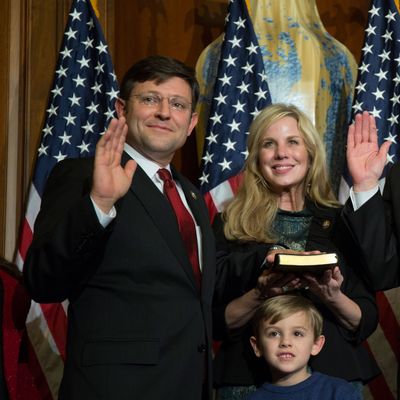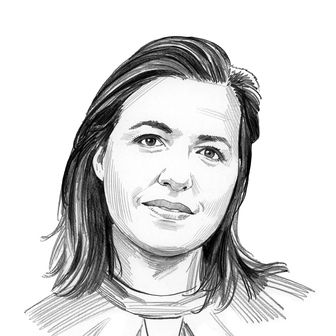
What is it about Representative Mike Johnson that ended Republicans’ spasms of disunity, electing him Speaker of the House on Wednesday? The initial response was befuddlement, a collective who? Senator Susan Collins said she was going to have to Google him. And maybe that’s the point. Mike Johnson, man without enemies, Trump endorsee. Mike Johnson, low-key and sincere dude, a Ned Flanders type who, it has resurfaced, also was a primary architect of the election insurrection. Mike Johnson, a soldier of the Christian legal movement, the guy I drove to Bossier City, Louisiana, in August 2015 to talk with about what he believed.
At the time, Johnson was a lawyer defending Louisiana’s abortion restrictions — purported safety regulations designed to shut down clinics — in court and had just been elected, unopposed, to the State House of Representatives. I remember thinking how anodyne the office was, like a small-town personal-injury firm, as he cheerfully told me that soon the pro-lifers would outnumber the pro-choicers who aborted all their babies. I no longer have a recording, just a 27-page transcript, but my memory is that he kept his voice smooth and pleasant as he said, “Many women use abortion as a form of birth control, you know, in certain segments of society, and it’s just shocking and sad, but this is where we are. When you break up the nuclear family, when you tell a generation of people that life has no value, no meaning, that it’s expendable, then you do wind up with school shooters.”
We were talking as part of an interview series I was doing for msnbc.com (which has been mostly lost in the internet shuffle) in anticipation of the Supreme Court taking up a major abortion case, which it did a few months later. Johnson told me he hoped to be the one to argue before the justices.
By then, Johnson had spent 16 years in what he euphemistically described to me as “nonprofit constitutional-law organizations.” The most recognizable name on his résumé today is the Alliance Defending Freedom (ADF), a once-marginal litigation shop that, according to a recent count in The New Yorker, has won 15 Supreme Court cases in about a dozen years. In his time as a senior attorney for the ADF, Johnson defended Louisiana’s ban on same-sex marriage and represented a Christian college trying to opt out of covering birth control. ADF’s cases had already been key to the Supreme Court letting private employers opt out of covering birth control; it has since brought multiple cases of people who claim, with tenuous evidence, that they’re being forced to provide services to gay people. ADF would go on to write and defend the law that overturned Roe v. Wade last year.
We talked a lot about Roe that day, Mike Johnson and I. Donald Trump had already gone down that gold escalator, but conservatives were still performing shock at the outrageous things he was saying rather than being emboldened by them. Saying that Republicans wanted to overturn Roe v. Wade was still treated as liberal media hysteria because the right still felt like it had to go slow and hide the ball. Not Johnson, who called overturning Roe “the silver bullet.”
“I think the greatest tragedy in our culture is that we have allowed for the termination of 58 million some-odd pregnancies since Roe v. Wade,” he said. Referring to Project Veritas’s recently released, misleadingly edited videos claiming Planned Parenthood was profiting from fetal remains, Johnson continued, “And when we’ve descended to the point in society where we will chop up unborn children and sell their body parts, it’s a very dark day in the country.”
Johnson credited a malpractice case he’d brought against an abortion clinic 15 years earlier with being “the reason Louisiana has its current statutory scheme regulating abortion clinics.”
I asked him why he bothered to make clinics “safer” when he wanted to eliminate them. “I’m an attorney,” he responded. “I accept the law of the land. I think that case is wrongfully decided and I think one day Roe may be overturned, but until that point, what we have to do, what’s incumbent upon the state to do, is to protect women’s health to the greatest extent possible. You know, even Hillary Clinton says she wants abortion to be rare and safe.”
Having genially presented himself as law abiding and his cause as bipartisan, Johnson proceeded to tell a story of America not unlike the one Trump would narrate: a little mid-century nostalgia, a little American carnage. “A society that has become gradually more coarsened, more dangerous,” he said, adding, “When I was a kid, the most popular show on television was The Brady Bunch. When my father was a child, it was The Andy Griffith Show. Now it’s murder and mayhem. We’re not in a good place in America, and I think that’s beyond dispute.”
The cause, he said, was that “religion and morality” were gone from the center of life. “When the people largely respected that, you didn’t have the societal chaos that you have today.” Rather than imposing their religious views on others, his movement’s goal was to ensure that Christians wouldn’t be crushed. “The question is, could you be a person of faith and serve in public life? I think the founders would have said that emphatically yes.”
Where did that leave people with different beliefs? “It leaves them on the same footing as religious people in the free marketplace,” said Johnson, not missing a beat. “I mean, that’s what this is about, the free marketplace of ideas.”
At the trial where Johnson defended the state’s abortion restrictions, I pointed out the doctors testified behind a curtain because they feared violence. Johnson thought it was overwrought. “No one’s out to get abortion doctors as they claim,” he said. As for what the alternative was for people “using abortion as birth control,” he said, “Well, of course, the failproof method of birth control is abstinence. But in many public schools, for example, they’ve rejected that teaching ’cause they say it’s too religious, which is kind of a crazy notion, really.”
For all the bleakness he saw in American society, Johnson was buoyed by his belief that soon enough, abortion opponents would outnumber their foes simply by outbreeding them. “We’re going to win this in the public-opinion arena by sheer attrition, because those who believe in abortion abort their babies and those who believe in life have theirs. And those become voters.” That, or the votes of people who disagree with him would simply get tossed out.
Within a year, Johnson’s side lost the battle in the Supreme Court. In Whole Women’s Health v. Hellerstedt, Justice Anthony Kennedy sided with the liberals in declaring that restrictions on abortion actually had to be grounded in health and safety. It was, in retrospect, only a minor setback for Johnson’s movement. He understood what was at stake in that election, whichever Republican was on the ballot. “The next president will appoint at least two, perhaps three or more, justices to the Supreme Court, and that is of huge consequence,” he told me. “As you know, many of these cases are decided 5-4. You tilt the balance by one or two persons on the bench, and we have a totally different situation.”
“It’s conceivable that Roe could be overturned,” he went on. “It’s conceivable that, you know, anything can happen.” Anything could and did. It would take seven years for Johnson to get his silver bullet, for what was then fringe to move right to the center. It would take only eight for him to go from obscure state legislator to second in the line of presidential succession.






























